On a recent weeknight, my 8-year-old and 11-year-old sons, my husband and I donned hairnets, aprons and gloves at Dallas’ Austin Street Center to serve dinner to hundreds of our homeless neighbors alongside other volunteers from our church.
There is something truly special about providing meals to those in need that inspires and humbles my family every time we do it. I suspect similar good intentions drive unsanctioned public feedings on downtown Dallas streets, sidewalks and private property that have become a scourge on our urban core in recent years, as a recent Dallas Morning News editorial correctly noted.
Many evenings and most weekends, groups mostly from outside of downtown set up street feeding operations that draw hundreds of people experiencing homelessness. The feeders serve out of vehicles, on folding tables and under tents, delivering cuisines of every variety.
These feedings come with serious public health and quality-of-life costs, many of which fall on the nonprofit I lead, Downtown Dallas Inc. (DDI). Members of our Clean Team are routinely diverted from other duties to clean up waste and debris left behind by the feedings. That work is likely to cost our organization — funded primarily by downtown property owners — more than $100,000 this year alone.
Opinion
The events also encourage groups to congregate, often on private property, and perpetuate an unhealthy dependency. Street feeding undermines the very strategy Dallas has embraced to reduce and ultimately solve homelessness: connecting people to housing and services.
The Street to Home initiative, launched in summer 2024 and led by Housing Forward in partnership with the city of Dallas and DDI, helped more than 270 individuals move from downtown streets into permanent housing in less than a year. This approach pairs housing with wraparound services. It is working at a time when many major U.S. cities are seeing homelessness increase.
Dallas City Manager Kimberly Bizor Tolbert’s budget proposal for fiscal 2026 would infuse another essential $10 million in this strategy citywide, part of the $28 million public-private phase two.
Meals served on the street can draw individuals away from shelters and providers like Austin Street, The Bridge, OurCalling and Dallas Life, places equipped to offer more than food. These providers offer case management, medical care, mental health services and pathways to housing. In short, they offer a way off the street.
Street feeding is also disrespectful to the 15,000-plus people who have chosen to live in downtown Dallas apartments, condominiums and townhomes, as well as the 100,000 daily workers, and millions more visitors. These feedings are not compatible with the vibrant community we have become. They surely would not be tolerated to this degree in my neighborhood, or any other neighborhood in our city.
For all these reasons, our recently launched comprehensive public safety initiative, Safe in the City, specifically identified street feedings as one of the key drivers of quality-of-life challenges in downtown. DDI, in partnership with Dallas City Hall, Housing Forward, the Dallas Citizens Council, the Dallas Regional Chamber and dozens of other corporations and nonprofits, is committed to doing everything we can to discourage these feedings.
The city’s recent enforcement of ordinances regulating public food distribution is not new policy but long-overdue implementation of existing rules. This enforcement responds to years of feedback from residents, businesses and even service providers who have seen firsthand the disorder, litter and public health challenges that can result.
This enforcement is not about penalizing generosity or denying anyone their right to public expression of their values. It is about channeling compassion into systems that work. And we know what works.
Dallas has a rare opportunity right now. Overall crime downtown is down nearly 20% this year, thanks to targeted policing, outreach and coordinated services. Billions of dollars in new development are in the pipeline. The 2026 FIFA World Cup will put Dallas on a global stage. A new downtown DISD preK-12 school, Nolan Estes Plaza, is under construction, and our new and expanded convention center is set to open by 2029.
We can build on this momentum, or we can choose to allow uncoordinated, counterproductive practices to chip away at our progress.
If you truly want to help, connect with one of our incredible local providers. Volunteer to serve a meal indoors. Donate food or funds. Offer your skills to a shelter or service center. These organizations are ready to welcome you into safe, dignified spaces where people get the help they need – all without trashing our parks, blocking our sidewalks or pulling people away from a path to stability.
Our family has found serving in this way to be one of the most rewarding things we do together. I believe you will too.
Jennifer Scripps is president and CEO of Downtown Dallas Inc.
